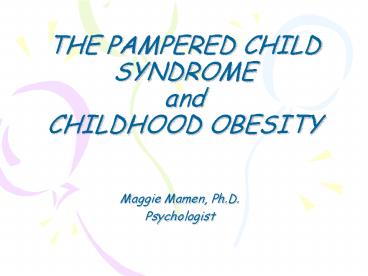THE PAMPERED CHILD SYNDROME and CHILDHOOD OBESITY - PowerPoint PPT Presentation
1 / 15
Title:
THE PAMPERED CHILD SYNDROME and CHILDHOOD OBESITY
Description:
Signs/symptoms of major physical or mental disorder (e.g., depression, anxiety, bipolar disorder, ADHD, ODD, conduct disorder, obesity) ... – PowerPoint PPT presentation
Number of Views:143
Avg rating:3.0/5.0
Title: THE PAMPERED CHILD SYNDROME and CHILDHOOD OBESITY
1
THE PAMPERED CHILD SYNDROMEandCHILDHOOD OBESITY
- Maggie Mamen, Ph.D.
- Psychologist
2
BASIC REQUIREMENTS FOR PHYSICAL AND MENTAL HEALTH
- Adequate sleep
- Good nutrition
- Fresh air and exercise
- Nurturing
- Safety and security
3
PARENTS COMMENTS
- We cant get her to go to bed
- He doesnt like healthy food
- She doesnt like doing any kind of exercise
- We cant persuade him to switch off the
TV/Nintendo/computer/MSN - If he doesnt get what he wants, he hits me
- She has a hissy fit if we ask her to wear a bike
helmet
4
In other words
- We cant make them thats being
authoritarian/strict/mean - We cant say no it might damage their
self-esteem - We cant decide for them children should make
their own choices - even if their lives depend on it
5
PARENTS GOALS to raise children who
- are comfortable and happy
- are stimulated and enriched
- can make their own choices
- are included in family decisions
- are given reasons for what we ask them to do
- are treated equally and fairly
- can express their feelings and be heard
6
MESSAGES RECEIVED
- I should never be uncomfortable or unhappy, and
when I am, someone should do something about it - I should never be bored
- No one can tell me what to do its my choice
- Adults should always consult me before making
decisions - I wont do anything unless I agree with the
reason Im given - I should be treated the same as adults
- I should only do things I feel like doing
- If I want it, you should give it to me
7
THE PAMPERED CHILD SYNDROME
- Exaggerated sense of entitlement
- Difficulty with delay of gratification poor
impulse control - Self-focussed
- Demanding of adult attention
- No respect for authority, boundaries
8
- Lack of self-discipline
- Low threshold for discomfort
- No resources for handling disappointment,
failure, loss - Little empathy, guilt, remorse
- Signs/symptoms of major physical or mental
disorder (e.g., depression, anxiety, bipolar
disorder, ADHD, ODD, conduct disorder, obesity)
9
GRADUAL DISEMPOWERING OF PARENTAL RESPONSIBILITY
- Backlash from authoritarian parenting, parent
blaming - Political events in 60s and 70s
- Love is enough
- Childrens rights
- Legacy of abuse focus on self-esteem
- Child-centred parenting philosophies
- It takes a village professionalizing
parenting - Marketing, advertising, nag factor
10
ADVERTISERS, PARENTS AND OBESITY
- Incidence of obesity highest in children who
watch 4 hours of TV/day - The average child sees 40,000 commercials a year
- Children influence about 75 of family food
purchases and 67 of car purchases - Eatertainment food must be fun!
- Marketers rely on parental inability to say no
to childrens desire to fit in - Companies bypass parents by marketing at school
- Message listen to us, not your parents
11
(No Transcript)
12
WHAT PARENTS CAN CONTROL
- What food is available in the home
- Choices offered to children
- What portions are served and when
- Culture of mealtimes
- Amount of exercise/outdoor activity
- TV/computer/video games
- Their own lifestyle choices
13
SEVEN HABITS OF HIGHLY EFFECTIVE PROFESSIONALS
- Empathize there but for fortune
- Explore parental goals/messages
- Ensure strategies are in line with goals
- Educate - provide accurate information
- Encourage healthy lifestyle choices
- Expect positive results
- Empower parents to parent
14
So that our children can
- Know their faculties
- Test their strengths
- Train for real life
- Alfred Adler
15
AND REMEMBER ... when it comes to making a
difference
- whether you think you can
- or
- whether you think you cant
- YOURE RIGHT!































